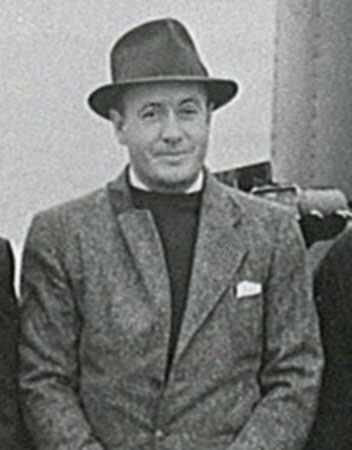JULIAN K. MORRISON, JR., LT, USN
Julian Morrison, Jr. '25
Lucky Bag
From the 1925 Lucky Bag:
Julian Knox Morrison, Jr.
Memphis, Tennessee
Joe
PRESENTING a care-free and untroubled mien, "Joe" sauntered into the happy midst of the privileged few. He had come from the evil interior of Mississippi to see this place that he'd "heared tell so much about." "Never trouble trouble till trouble troubles you" would best describe "Joe's" creed of existence. And, though his share of troubles have been fairly large, they are kept well-hidden under a nonchalant attitude that would have made the well-known Casey Jones appear as a nervous wreck.
"Joe" and the Academics have always been locked in a bitter struggle, with the academics usually favored as the winner. But when the battle was over and the smoke and chalk dust had cleared away, the result was always the same—Joe had grabbed the victory with a 2.5001, which he figured gives him plenty of velvet for the next term.
With an inexhaustible supply of stirring tales of a former life in the Delta country, this boy seldom fails to gather in the laurels when any sort of "he-napping" contest is being staged.
"That story reminds me of something that happened to me back in -----."
Class Track (2); Numerals (2); Class Wrestling (2, 1).

Julian Knox Morrison, Jr.
Memphis, Tennessee
Joe
PRESENTING a care-free and untroubled mien, "Joe" sauntered into the happy midst of the privileged few. He had come from the evil interior of Mississippi to see this place that he'd "heared tell so much about." "Never trouble trouble till trouble troubles you" would best describe "Joe's" creed of existence. And, though his share of troubles have been fairly large, they are kept well-hidden under a nonchalant attitude that would have made the well-known Casey Jones appear as a nervous wreck.
"Joe" and the Academics have always been locked in a bitter struggle, with the academics usually favored as the winner. But when the battle was over and the smoke and chalk dust had cleared away, the result was always the same—Joe had grabbed the victory with a 2.5001, which he figured gives him plenty of velvet for the next term.
With an inexhaustible supply of stirring tales of a former life in the Delta country, this boy seldom fails to gather in the laurels when any sort of "he-napping" contest is being staged.
"That story reminds me of something that happened to me back in -----."
Class Track (2); Numerals (2); Class Wrestling (2, 1).
Loss
Julian was lost on January 11, 1940 when he died of injuries sustained when the pistol he was cleaning accidentally discharged while aboard USS Sealion (SS 195). He had been commanding officer since the boat's commissioning on November 27, 1939.
Other Information
From researcher Kathy Franz:
Julian was born in Mississippi. He was enrolled at Ole Miss for one year where he was on the circulation staff for the University’s newspaper. He received his appointment to the Naval Academy from Congressman John E. Rankin.
On December 28, 1925, Julian married Drucilla B. Hallam in Los Angeles.
Julian, his wife and son Julian, Jr., sailed in May, 1934 from Los Angeles to Honolulu. Their other son was Vance Hallam Morrison.
His father Julian was a professor at Jefferson Military College in 1902. He later taught at Belhaven college and the extension department of the old A&M college. In 1940, he was associated with a group seeking passage of a workmen’s compensation law. The law passed in 1952.
His mother Liffie (Wyatt) was an exceptional pianist and music teacher; brothers were Darnell, Ferris and Austin. In 1920, the family lived in Coffeeville, Mississippi, and their grandmother lived with them. In 1927, they lived in Memphis, Tennessee.
He was survived by his wife and his son, Julian Knox Morrison, III. Julian Jr. is buried in Arlington National Cemetery.
The March 1940 issue of Shipmate magazine: "JULIAN KNOX MORRISON, JR., Lt., U.S.N., '25. Died in St. Petersburg, Florida, on January 11, 1940."
Photographs
From On Eternal Patrol:
The President of the United States of America takes pleasure in presenting the Navy Cross to Lieutenant Julian K. Morrison, United States Navy, for distinguished service in the line of his profession as Senior Assistant to the diving supervisor during the entire period of the rescue and salvage operations following the sinking of the U.S.S. SQUALUS on 23 May 1939. Lieutenant Morrison's technical diving knowledge and his ability in handling difficult situations in emergencies were outstanding. His calmness, courage and good judgment inspired confidence in his men as well as in the senior officers of the Unit. He made numerous deep dives himself and was the only diver to attempt to enter the SQUALUS while she was on the bottom, failing only due to circumstances beyond his control. His superior and outstanding performance of duty contributed much to the success of the operations and characterizes conduct above and beyond the call of duty.
General Orders: Bureau of Navigation Bulletin 278 (February 10, 1940)
Action Date: 1939
Service: Navy
Rank: Lieutenant
Company: Assistant Diving Officer
Regiment: Squalus Salvage Unit
Division: U.S.S. Falcon (ASR-2)
Memorial Hall Error
Julian is not listed in Memorial Hall with his classmates, though his loss is clearly an operational one.
He was identified through the diligent efforts of Leslie Poche, a volunteer who combed through Shipmate issues to find operational losses not accounted for in Memorial Hall.
The "Register of Commissioned and Warrant Officers of the United States Navy and Marine Corps" was published annually from 1815 through at least the 1970s; it provided rank, command or station, and occasionally billet until the beginning of World War II when command/station was no longer included. Scanned copies were reviewed and data entered from the mid-1840s through 1922, when more-frequent Navy Directories were available.
The Navy Directory was a publication that provided information on the command, billet, and rank of every active and retired naval officer. Single editions have been found online from January 1915 and March 1918, and then from three to six editions per year from 1923 through 1940; the final edition is from April 1941.
The entries in both series of documents are sometimes cryptic and confusing. They are often inconsistent, even within an edition, with the name of commands; this is especially true for aviation squadrons in the 1920s and early 1930s.
Alumni listed at the same command may or may not have had significant interactions; they could have shared a stateroom or workspace, stood many hours of watch together… or, especially at the larger commands, they might not have known each other at all. The information provides the opportunity to draw connections that are otherwise invisible, though, and gives a fuller view of the professional experiences of these alumni in Memorial Hall.
October 1925
January 1926
October 1926
January 1927
April 1927
October 1927
January 1928
April 1928
July 1928
October 1928
January 1929
April 1929
July 1929
October 1929
January 1930
April 1930
October 1930
January 1931
April 1931
July 1931
October 1931
January 1932
April 1932
October 1932
January 1933
April 1933
July 1933
October 1933
October 1934
January 1935
April 1935
July 1936
September 1937
January 1938
July 1938
January 1939
October 1939

The "category" links below lead to lists of related Honorees; use them to explore further the service and sacrifice of alumni in Memorial Hall.



